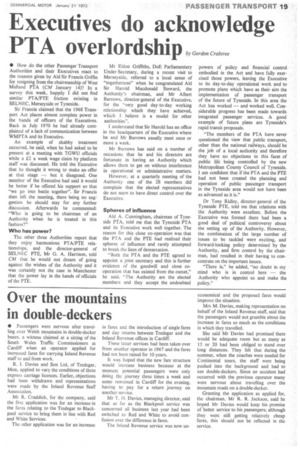Executives do acknowledge PTA overlordship
Page 21

If you've noticed an error in this article please click here to report it so we can fix it.
• How do the other Passenger Transport Authorities and their Executives react to the reasons given by Aid Sir Francis Griffin for resigning from the chairmanship of West Midland PTA (CM January 14)? In a survey this week, happily I did not find similar PTA/PTE friction existing in SELNEC, Merseyside or Tyneside, Sir Francis claimed that the 1968 Transport Act places almost complete power in the hands of officers of the Executives. Back in July 1970 he had already complained of a lack of communication between WMPTA and its Executive.
An example of shabby treatment occurred, he said, when he had asked to be present at a meeting with TGWU officials while a £2 a week wage claim by platform staff was discussed. He told the Executive that he thought it wrong to make an offer at that stage --.but it disagreed. One member of the Executive had said it would be better if he offered his support so that "we go into battle together". Sir Francis then left the meeting, there being no suggestion he should stay for any further discussion. Afterwards he commented: "Who is going to be chairman of an Authority when he is treated in this fashion?"
Who has power?
The other three Authorities report that they enjoy harmonious PTA/PTE relationships, and the director-general of SELNEC PTE, Mr G. A. Harrison, told CM that he would not dream of going against the wishes of the Authority and it was certainly not the case in Manchester that the power lay in the hands of officials of the PTE. Mr Eldon Griffiths, DoE Parliamentary Under-Secretary, during a recent visit to Merseyside, referred to a local sense of "togetherness" when he congratulated Ald Sir Harold Macdonald Steward, the Authority's chairman, and Mr Albert Burrows, director-general of the Executive, for the "very good day-to-day working relationship which they have achieved, which I believe is a model for other authorities".
I understand that Sir Harold has an office in the headquarters of the Executive where he and Mr Burrows usually meet once or more a week.
Mr Burrows has said on a number of occasions that he and his directors are fortunate in having an Authority which allows them to get on without interference in operational or administrative matters.
However, at a quarterly meeting of the Authority one of the 28 members did complain that the elected representatives do not seem to have direct control over the Executive.
Spheres of influence Aid A. Cunningham, chairman of Tyneside PTA, told me that the Tyneside PTA and its Executive work well together. The reason for this close co-operation was that the PTA and the PTE had realized their spheres of influence and rarely attempted to break the lines of demarcation.
"Both the PTA and the PTE agreed to appoint a joint secretary and this is further evidence of the goodwill and close cooperation that has existed from the outset," he said. "The Authority are the elected members and they accept the undoubted 'powers of policy and financial control embodied in the Act and have fully exercised those powers, leaving the Executive to its day-to-day operational work and to promote plans which have as their aim the implementation of passenger transport of the future of Tyneside. In this area the Act has worked — and worked well. Considerable progress has been made towards integrated passenger services. A good example of future plans are Tyneside's rapid transit proposals.
"The members of the PTA have never questioned the view that public transport, other than the national railways, should be the job of a local authority and therefore they have no objections to this facet of public life being controlled by the new Metropolitan County Council of Tyneside. I am confident that if the PTA and the PTE had not been created the planning and operation of public passenger transport in the Tyneside area would not have been as advanced as it is."
Dr Tony Ridley, director-general of the Tyneside PTE, told me that relations with the Authority were excellent. Before the Executive was formed there had been a good deal of political controversy about the setting up of the Authority. However, the combination of the large number of issues to be tackled were exciting, and forward-looking policy determined by the Authority, and firm control by the chairman, had resulted in their having to concentrate on the important issues.
"There is," he added, "no doubt in my mind who is in control here — the Authority who appoint us and make the policy."
economical and the proposed fares would improve the situation.
Mrs M. Davies, making representation on behalf of the Inland Revenue staff, said that the passengers would not grumble about the increase in fares so much as the conditions in which they travelled.
She said Mr Davies had promised there would be adequate room but as many as 15 or 20 had been obliged to stand over long distances. They felt that during the summer, when the coaches were needed for Continental tours, the staff were being pushed into the background and had to use double-deckers. Since an accident had occurred with the previous operator many were nervous about travelling over the mountain roads on a double-decker.
Granting the application as applied for, the chairman, Mr R. R. Jackson, said he hoped Mr Davies would keep his promise of better service to his passengers; although they were still getting relatively cheap fares, this should not be reflected in the service.










































































































